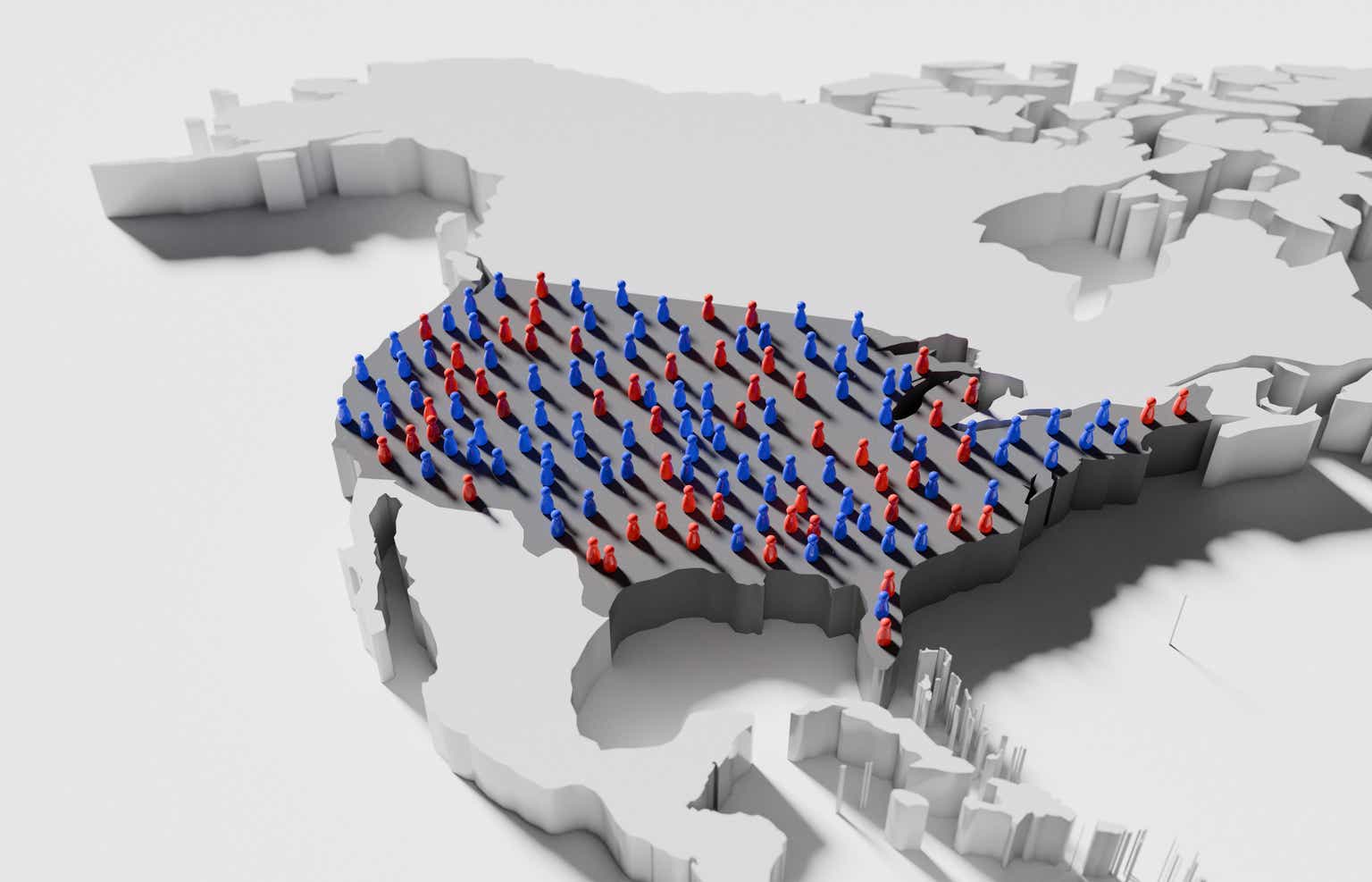Why are mortgages so expensive in Canada? A look at 2024 and 2025
Is your salary enough to buy a home in these Canadian cities? Here’s how much you needed to earn to qualify for a mortgage in 2024. The post Why are mortgages so expensive in Canada? A look at 2024 and 2025 appeared first on MoneySense.

Housing affordability—while still extremely expensive in many of Canada’s major real estate markets—was all over the map in 2024, as central bank interest rate cuts reduced mortgage rates, and a lack of demand in the first half of the year kept a lid on buyer competition.
According to the year-end affordability report compiled by Ratehub.ca, home prices ended 2024 at higher levels in 11 of the 13 markets studied, but the effects of easier borrowing costs helped offset steeper costs, improving overall affordability in nine regions. The study determines how affordability conditions evolve in real estate across Canada by calculating the changing amount of income required to qualify for a mortgage in each city. The report is based on 2024 real estate data from the Canadian Real Estate Association (CREA), as well as mortgage and stress test rates.
The December 2024 calculations (updated monthly, so bookmark this page) show that during the 12-month period, the average five-year fixed mortgage rate lowered from 5.71% to 4.99%. This resulted in the mortgage stress test, which added 2% onto the contract rate for new mortgage applicants, falling to 6.99% from 7.71%.
That’s had a considerable impact on some of Canada’s priciest markets, and reflects the five rate cuts passed down by the Bank of Canada (BoC) between June and December, which brought Canada’s benchmark cost of borrowing from 5% to 3.25%.
Let’s take a look at how this affected the required income in housing markets across Canada.
The best places to buy real estate in Canada
Housing affordability across Canada’s major cities
Check out the chart below to see how affordability changed in 2024, between January and December, in Canada’s main housing markets, based on the income required to qualify for a mortgage.
2024 year in review: How much do you need to earn to buy a home in Canada?
To see more data on these two charts, scroll the chart left to right with your fingers or press shift, as you use scroll wheel on your mouse to read.
City January
Stress test rate: 7.71%
Mortgage rate: 5.71%February
Stress test rate: 7.63%
Mortgage rate: 5.63%March
Stress test rate: 7.62%
Mortgage rate: 5.62%April
Stress test rate: 7.50%
Mortgage rate: 5.50%May
Stress test rate: 7.49%
Mortgage rate: 5.49%June
Stress test rate: 7.47%
Mortgage rate: 5.47%July
Stress test rate: 7.29%
Mortgage rate: 5.29%August
Stress test rate: 7.16%
Mortgage rate: 5.16%September
Stress test rate: 7.04%
Mortgage rate: 5.04%October
Stress test rate: 6.86%
Mortgage rate: 4.86%November
Stress test rate: 6.81%
Mortgage rate: 4.81%December
Stress test rate: 6.99%
Mortgage rate: 4.99%Change in income (January to December) Toronto $210,200 $213,950 $216,920 $217,170 $215,920 $214,360 $208,950 $204,100 $199,800 $195,420 $194,900 $197,800 -$12,400 Vancouver $228,800 $230,110 $232,910 $232,150 $232,950 $231,700 $226,680 $224,000 $219,000 $214,460 $213,600 $216,700 -$12,100 Hamilton $163,910 $167,500 $170,160 $169,550 $171,100 $167,550 $164,040 $161,800 $158,740 $154,680 $153,550 $152,450 -$11,460 Victoria $169,810 $169,510 $171,050 $170,950 $172,180 $171,650 $169,200 $166,420 $164,450 $163,350 $162,550 $164,650 -$5,160 Halifax $110,650 $110,600 $111,560 $113,960 $111,890 $113,450 $112,420 $109,940 $108,000 $106,710 $104,340 $106,780 -$3,870 Calgary $116,000 $117,550 $119,250 $119,500 $120,520 $120,670 $118,980 $117,360 $115,600 $113,250 $112,460 $113,500 -$2,500 Ottawa $128,100 $129,720 $130,300 $131,000 $132,060 $131,210 $129,650 $127,830 $126,100 $123,770 $122,820 $126,150 -$1,950 Montreal $109,500 $110,060 $111,620 $110,550 $111,010 $111,460 $109,170 $108,550 $108,900 $107,550 $107,070 $108,400 -$1,100 Regina $69,930 $71,780 $71,740 $72,240 $72,450 $72,010 $71,180 $70,780 $70,360 $69,520 $68,060 $68,860 -$1,070 Winnipeg $76,400 $78,100 $78,890 $79,150 $79,350 $80,020 $78,820 $78,140 $77,600 $76,400 $76,000 $76,750 $350 Edmonton $82,280 $83,180 $84,680 $84,850 $85,540 $86,920 $85,560 $84,850 $83,990 $82,450 $81,910 $83,330 $1,050 St. John’s $75,620 $74,790 $75,840 $75,820 $76,210 $76,880 $76,720 $76,880 $77,880 $77,120 $76,600 $77,990 $2,370 Fredericton $67,510 $67,770 $68,180 $69,150 $69,660 $70,230 $70,020 $69,310 $68,860 $70,750 $72,870 $73,640 $6,130
Get free MoneySense financial tips, news & advice in your inbox.
Canadian cities where affordability improved
Where in Canada is owning a home becoming more affordable?
Toronto: A quiet start to the year
As one of Canada’s most expensive housing markets, home buyers in the Greater Toronto Area started the year squeezed by a double-whammy of steep home prices and sky-high interest rates. Coming off a prolonged BoC rate hold that had kept the benchmark rate at 5% (a historic high) since July 2023, many would-be purchasers held off on entering the market in hopes that rates would soon start to come down.
That narrative shifted considerably once the BoC started lowering rates in June. Easier borrowing costs effectively decreased the required income amount by $12,400 in the GTA between January and December. This was further aided by a slight year-over-year price decrease of $3,400, ending the year at $1,061,900; still elevated when compared to other markets, but offering welcome relief to local buyers.
“Borrowing costs were top of mind for home buyers in 2024. High interest rates presented significant affordability hurdles and kept home sales well below the norm,” stated Toronto Regional Real Estate Board (TRREB) president Elechia Barry-Sproule, in the board’s December release.
“The housing market did benefit from substantial Bank of Canada rate cuts in the second half of the year, including two large back-to-back reductions. All else being equal, further rate cuts in 2025 and home prices remaining below their historic peaks should result in improved market conditions over the next 12 months.”
Vancouver: Sales under the historical average
A similar scenario to Toronto’s unfolded in Vancouver; the year was split between the before- and after-rate cut effect, with many buyers choosing to remain on the sidelines for the first six months of 2024. As a result, year-over-year home sales marked just a 1.2% increase, with 26,561 homes sold: 21% below the 10-year sales average.
According to Greater Vancouver Realtors Director of Economics Andrew Lis, 2024 marked a “pivot year” for the housing market; by the end of 2024, the average home price was up a scant $4,700 from the previous year, at $1,171,500.
Combined with lower mortgage rates, the required income to qualify for a mortgage in Vancouver lowered by $12,100, putting it in second place in terms of improved affordability.
Hamilton: Sluggish sales and supply limited price growth
Similarly to other markets in Ontario’s Greater Golden Horseshoe, Hamilton’s real estate market experienced a year of uncertainty. According to the Realtors’ Association of Hamilton-Burlington,
“The higher interest rate environment and economic uncertainty weighed on housing market activity in 2024. Slower sales throughout the spring season offset the improvements that occurred later in the year as interest rates eased. Sales in 2024 totaled 10,210, slightly above 2023 levels but 26% below long-term trends.”
As a result, the average home price in Hamilton decreased by $14,300 between January and December 2024 to $798,600, with the average required income declining by $11,460.
Just one Canadian city saw affordability worsen during the month of October:
Fredericton: A strong surge in sales
Fredericton was the only city that saw affordability worsen, with $1,890 more income required to purchase the average home. This was due to the significant month-over-month home price increase of $16,100, bringing the city’s average to $328,100. This was driven by a strong uptick in sales in October:year-over-year activity came in 12% higher across the province, leading to the same-sized increase in the benchmark home price. That was enough to offset the effects of lower mortgage rates, making it slightly tougher to buy a home in the east coast city.
Canadian cities where affordability worsened
Just one Canadian city saw affordability worsen during the month of October:
Fredericton: A strong sellers’ market
Fredericton, New Brunswick’s capital city, experienced a robust year for sales, with transactions up 13.5% year over year in December, according to the New Brunswick Real Estate Board. The association points out that it was a “standout year” for the province in general.
“Our local market wrapped up the year in seller’s territory, and with the recent changes to mortgage rules and the potential for another rate cut on the horizon it remains to be seen whether the usually quieter winter months will heat up, or if buyers will hold off until spring,” said Mike Power, chair, New Brunswick Real Estate Board.
Sustained seller-friendly market conditions put upward pressure on home prices, which rose $54,000 between January and December. As a result, the required income to buy a home rose by $6,130, positioning Fredericton as the market with the most eroded affordability in 2024.
St. John’s: Short supply kept prices firm
While St. John’s experienced a slower year in terms of sales compared to Newfoundland and Labrador, falling 8.4% compared to the rest of the province’s overall 23.7% uptick, tight supply kept a floor under prices and overall affordability. According to the Newfoundland and Labrador Association of Realtors, active listings remained 24.7% below the five-year average and 38.2% below the 10-year average in the month of December.
The average home price in the east coast city, meanwhile, increased by $35,000 over the course of the year to $366,300, requiring local buyers to earn $2,370 more to qualify for a mortgage on the average-priced home.
Edmonton: Low inventory keeps market in sellers’ territory
2024 marked a year over recovery for home sales, with the December total of 1,428 coming in 17.2% higher than 2023 levels. Meanwhile, the number of new listings plunged by 33.3% month over month, and 7.2% annually, reports the Realtors’ Association of Edmonton. That helped fuel a year-over-year increase in the average Edmonton home price by $29,800, to $397,400, meaning Edmonton-area buyers must earn $1,050 more to qualify for a mortgage.
How much mortgage can you afford? How much house can you buy?
This monthly report tracks how affordability conditions change in major markets across Canada, based on evolving mortgage rates, home prices and the mortgage stress test. If you’re wondering how your own affordability would measure up, you can calculate your own numbers using the MoneySense mortgage affordability calculator. You can also check this table to compare mortgage rates in Canada right now.
Will housing affordability improve for Canadians in 2025?
Right now, the forecast for Canadian interest rates is a bit of a mixed bag. Our own domestic economic data, such as inflation, supports several more rate cuts from the BoC this year, with economists’ consensus calling for the overnight lending rate to end up between 2.50% to 2.75% by mid-year. The OLR is used by lenders to set their prime and variable mortgage rates.
The latest Canadian inflation numbers showed the Consumer Price Index (CPI) dropped slightly in December to 1.8%, which will allow the central bank to make another 25% cut in its next rate announcement on January 29.
However, there are quite a few factors that could disrupt this trajectory—namely wild uncertainty over incoming tariffs from the United States. President Donald Trump indicated a 25% levy on all Canadian exports should be a reality on February 1.
If this actually materializes, it would have devastating effects on Canada’s economy and our jobs market, while at the same time driving inflation higher.
In an analysis co-written by BMO economists Douglas Porter and Robert Kavcic, such tariffs could weigh Canadian GDP growth down by nearly two points, and would depress the loonie, all while Canadian trade retaliations and increased fiscal spending fuel inflation.
The BoC, meanwhile, would be forced to cut rates lower despite the inflation impact.
“The Bank of Canada would ultimately deliver much more interest rate relief than under a status quo backdrop,” reads the analysis. “While it may not all come in one fell swoop, we suspect that the Bank would cut by at least an additional 100 bps beyond relief already in train, taking the overnight rate down to 1.50%… and may move faster than our current call. This could mean that the Bank would deliver a cumulative 350 bps of rate relief within the space of a year.”
However, such deep rate relief wouldn’t be much solace in the face of widespread job loss and impending recession. And bond markets are likely to spike once more as the threat of inflation rears again, which could put upward pressure on fixed mortgage rates.
Those currently shopping for a mortgage are wise to get a pre-approval and lock in with a rate hold. That can guarantee access to the lowest rate for up to 120 days, and will help to avoid any unwanted rate surprises in the short term.
The takeaway for today’s home buyer is that the only sure thing this year will be market volatility.
Read more about mortgages:
- Where to buy real estate in Canada
- The complete guide for first-time home buyers in Canada
- Tools to calculate your mortgage payments and costs in Canada
- Mortgage refinance calculator
- Mortgage renewal calculator
This article was created by a MoneySense content partner.
This is an unpaid article that contains useful and relevant information. It was written by a content partner based on its expertise and edited by MoneySense.
The post Why are mortgages so expensive in Canada? A look at 2024 and 2025 appeared first on MoneySense.
What's Your Reaction?















































































